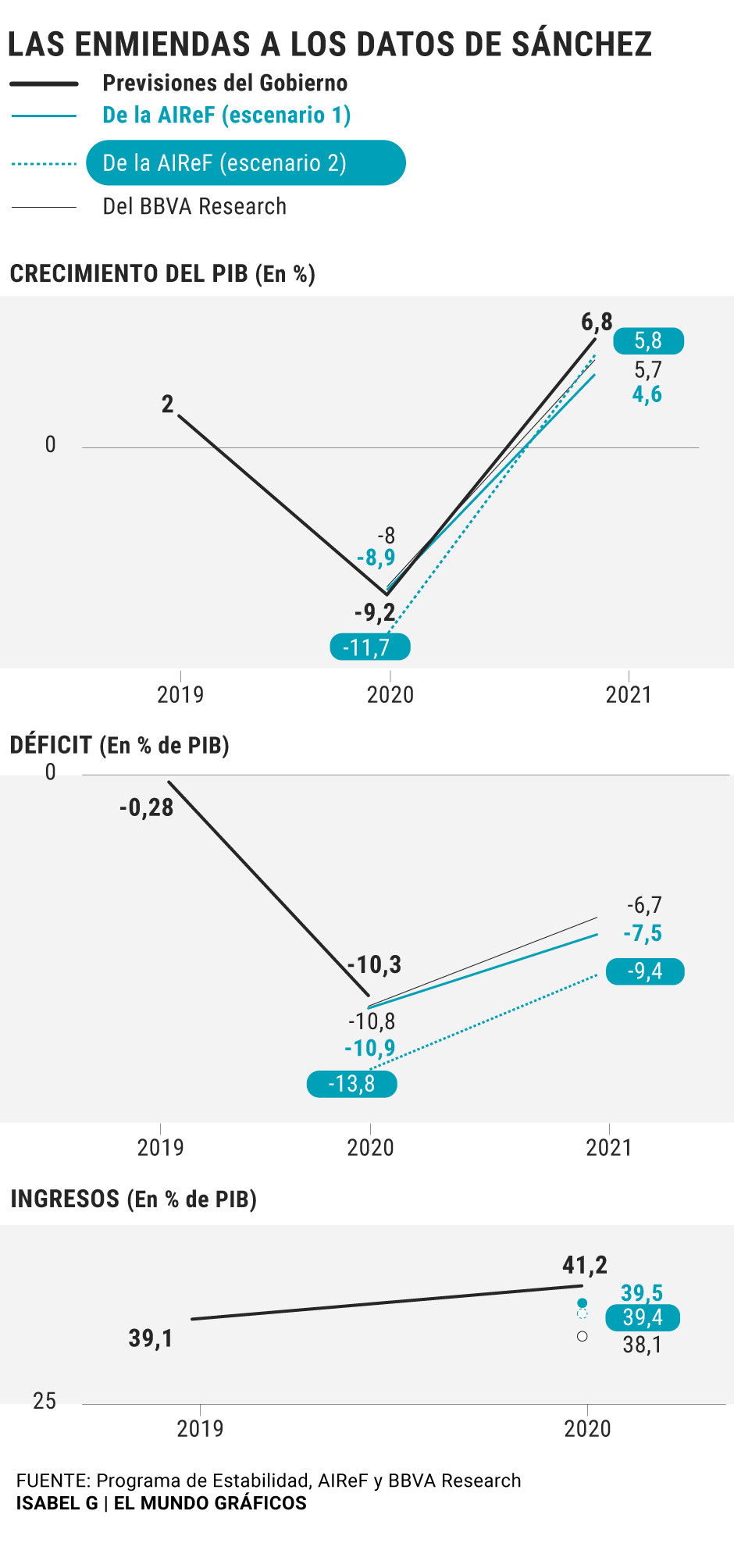- Live.Coronavirus Spain, live breaking news
- Coronavirus.The Government maintains its massive tax increase in the midst of a crisis
- Covid-19: The coronavirus crisis is fattening with Spain: it leads the economic contraction in Europe
The Government's economic forecasts are inflated and transmit a situation that, although it is still very negative, it is slightly or significantly better than that drawn by many other institutions. It depends on the variables and the body that develops them, but the differences with respect to the official data are a constant that evidences a practice previously used by the Executive of Pedro Sánchez previously.
The stability program sent to Brussels shows "significant discrepancies with the BBVA Research scenario," they underlined from the entity's research service in a recent document. " The greatest uncertainty is found in the revenue forecast , where the program assumes a drop of just 5% compared to 2019 [BBVA Research: -11%], reflecting less sensitivity to the economic cycle," added analysts from the entity making clear that the government data is very limited.
Something similar occurs if you go to the analysis of the same document that the Independent Authority for Fiscal Responsibility (AIReF) carried out and published on May 6. The organization led by Cristina Herrero estimates "that the income will be between 39.4% and 39.5% of GDP in 2020, below the 41.2% " expected by the Government. This implies "a decrease in income between 7.9% and 11.4% compared to 2019, that is, between 38,500 and 55,600 million less than in the previous year as a result of the fall in economic activity due to the crisis », Adds the Tax Authority, explaining what, according to their estimates, will be the real situation of the income.
And Ángel de la Fuente, director of Fedea, published a report last week in which he pointed out that in Spain tax collection varies "almost exactly" in the same proportion as the Gross Domestic Product (GDP). The government, however, estimates that the economy will collapse this year by 9.2%, well above what it expects to see revenue decline. In other words, that the economy will perform much better than in the past and almost unpublished .
The deficit and debt figures also raise many doubts. Even its most "benevolent" scenario, the Fiscal Authority registers a deficit of 10.9% for 10.3% of the Government, but if the alternative scenario is taken into account, in which the recovery is complicated, the difference increases remarkably that the deviation would go up to almost 14%.
Nor do the growth figures escape from the government's attempt to paint a less negative situation. Perhaps not for this year, in which the differences are smaller, but yes in the rate at which the country will recover, which is a vital aspect. The Executive moderated his tone since the recovery in V that was initially predicted by the Minister of Finance and government spokesperson, María Jesús Montero, was replaced by the "asymmetric V" that was detailed by the vice president for Economic Affairs, Nadia Calviño. And that is nothing more than a less pronounced rebound and a longer period of time to return to the starting point. But even so, this scenario continues to fall short compared to the one recently portrayed by Funcas: until 2023 it will not be possible to return to the levels observed at the end of 2019.
All of these discrepancies also occur after non-compliances in revenue forecasts or correction of estimates that the Government has already suffered in the past. The most sonorous chapter, without a doubt, was the one that suffered with the deficit of last year, whose self-imposed objective was revised upwards on several occasions and which finally not only did not meet but also advanced an official data that was not correct either. Eurostat raised it by two tenths, up to 2.8%, thus making evident the government's desire to inflate the figures .
In accordance with the criteria of The Trust Project
Know more- Crisis
- Covid 19
- Coronavirus
According to Funcas, the crisis will last at least three years: the economy will not recover to the pre-pandemic level until 2023
The Covid-19 pushes ceramics into its fourth sectoral crisis
Covid-19The coronavirus crisis is fattening with Spain: it leads the economic contraction in Europe

